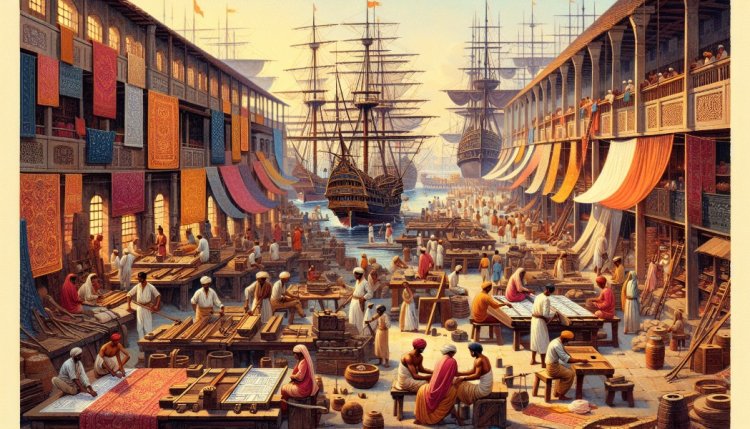The Dark Legacy of Colonialism: How India's Economic Power Was Unmade
From riches to ruin: Unmask the hidden scars of colonialism on India's economic power. Explore resource plunder, infrastructure neglect, and the enduring struggle for economic justice.

Introduction.
Welcome to India in the 18th century, a time with a difficult and complicated past. In 1700, India had a very big part in the world's economy. It was 27 percent, which was more than all of Europe combined. But after 250 years, India's share decreased to less than 3 percent, and its people became poor. What occurred? In this blog, we will explore the lesser-known story of how colonial rule affected India's economic power.
The passing of Mogul Emperor Aurangzeb
In 1707, Mogul Emperor Aurangzeb died, and this caused the empire to go into a long period of decline. In the past, some not-so-strong rulers took control of the Peacock Throne, which caused a time of chaos and fighting among themselves. The British saw a chance and used bribes and force to become powerful on the subcontinent. The British viewed India as a never-ending source of wealth and took advantage of its resources more than previous invaders.
India, before colonization, was a powerful manufacturing hub.
India used to be a strong manufacturing country before the British came. The textile industry was well-known globally. Different areas focused on making different products. By the mid-18th century, Indian textiles made up a significant 25 percent of global trade. The textile trade's success helped other industries grow, like shipbuilding and metalworking.
The textile industry is a sector that involves the production of fabrics and textiles.
India's textile industry was very important in the worldwide market. Coastal Andhra was famous for block printing, while Gujarat and Bengal made fancy-woven items. The need for Indian textiles caused the development of reliable global distribution systems, which also helped other Indian craftsmen. The textile industry's success affected the whole Indian economy.
The shipbuilding industry is the sector responsible for constructing ships.
Indian ports were involved in making ships, and whole rural communities helped make materials for building ships. Indian ships were famous for being beautiful and useful, and they lasted longer than English ships. The shipbuilding industry in India was important for global trade.
The metalworking industry is an industry that involves working with metals to create various products. It is a field that requires specialized skills and knowledge to manipulate and shape different types of metals.
India was one of the first countries to lead the way in the worldwide steel industry. Indian blacksmiths made crucible-formed steel that was popular in the Arab and European markets. It was also called Wootz or Damascus Steel. Indian blades were highly valued and showed off India's metalworking skills.
How Britain Affected India's Development
After the British gained control, they altered the Indian economy to benefit themselves. They took control of Indian textiles and stopped selling them abroad, which caused problems for the trade connections that had been in place for a long time. The British also made a change to the payment system. They started using tax money collected from India instead of using foreign currency. These changes made the Indian economy stop growing, and skilled workers became much poorer and had more limitations than before.
Breaking down Native Industries
The British took apart local businesses, put rules in place, and got rid of rivals. They also used violence by breaking Indian looms and stopping weavers from working. The British put a very high 80% tax on Indian textiles, which made it not worth it to sell goods to the UK. India became a country that mainly sold raw materials, while British companies sold finished goods to Indians at higher prices.
Taxes and taking advantage
The British imposed very high taxes on Indian farmers, which caused a lot of poverty and made many people lose their land. Taxes were very difficult for many Indians to pay. This led to torture, taking away farmland, and many people moving away. The British put in taxes that were more than three times higher than the Indian kings' taxes. This caused a lot of suffering and exploitation for many people.
Hunger and a lack of care
The British government's decision to not get involved during famines led to the deaths of millions of Indians. The British sent Indian food to Britain and Europe, which made it too expensive for poor people to buy. The British cared more about making money for themselves than saving the lives of hungry Indians. This caused terrible famines and deaths that could have been avoided. The colonial government stopped people from helping peasants affected by famine, showing that they didn't care about Indian lives.
Getting money back to its original country
The British viewed India as a colony for extracting resources, without any plans to merge with the land or govern it as their own. They took a lot of money from India and sent it back to their faraway home. Contemporary economists say that Britain took around $43 trillion worth of wealth from India. The huge loss of money had a very bad effect on India's economy and its people.
The Impact of Colonialism
When India became independent in 1947, its own institutions were destroyed, its economy lost its industries, and its people were greatly divided. British colonial rule had a long-lasting impact on poverty, exploitation, and economic damage. Today, India is still rebuilding and recovering from the effects of colonialism, aiming for a better future for its citizens.
End
India's economy suffered greatly during British colonial rule, causing much pain and hardship. India used to be a strong manufacturing powerhouse, but the British gradually took apart its industries, imposed high taxes, and used its resources for their own gain. Colonialism's impact remains, but India's strength and drive to overcome its history still motivate. As we think about the past, let's remember how crucial it is to protect and honor the cultures and economies of every country.



 admin
admin 










